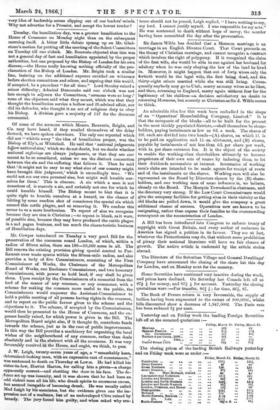Of some of the sermons which Messrs. Bouverie, Bright, and
Co. may have heard, if they availed themselves of the delay decreed, we have spoken elsewhere. The only one reported which .did not " whittle away " the idea of humiliation proper, was the Bishop of Ely's, at Whitehall. He said, that national judgments: follow national sins,' which we do not doubt, but we doubt whether national sufferings are always judgments, or that they are ever meant to be so considered, unless we see the distinct connection between the sin and the suffering that follows it. Then he said that ' it might not be easy to say what sins of our country might have brought this judgment,' which is exceedingly true. We could not see our own personal sins, but might well humble our- selves for them.' This is obscure. ,A sin which a man is not conscious of, is scarcely a sin, and certainly not one for which he -could humble himself. The Bishop meant to hint that it is quite right to humble ourselves at a hazard, on the chance of hitting by some random shot of conscience the special sin which ,caused this cattle plague, and so removing it. We confess this seems to us a mere heathenism. To repent of sins we recognize -because they are sins is Christian ;—to repeat in blank, as it were, of possible sins, because they may have produced' the cattle plague is a sad pagan business, and too much the characteristic business .of Humiliation days.






























 Previous page
Previous page